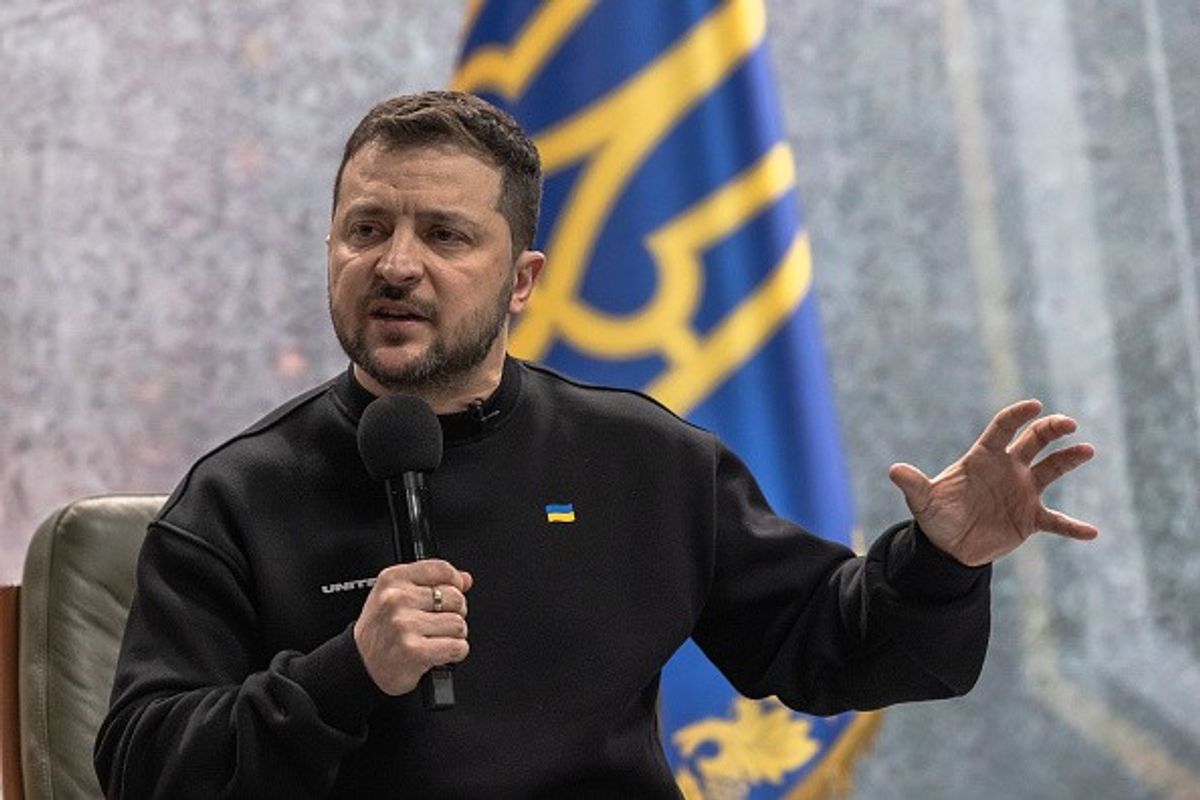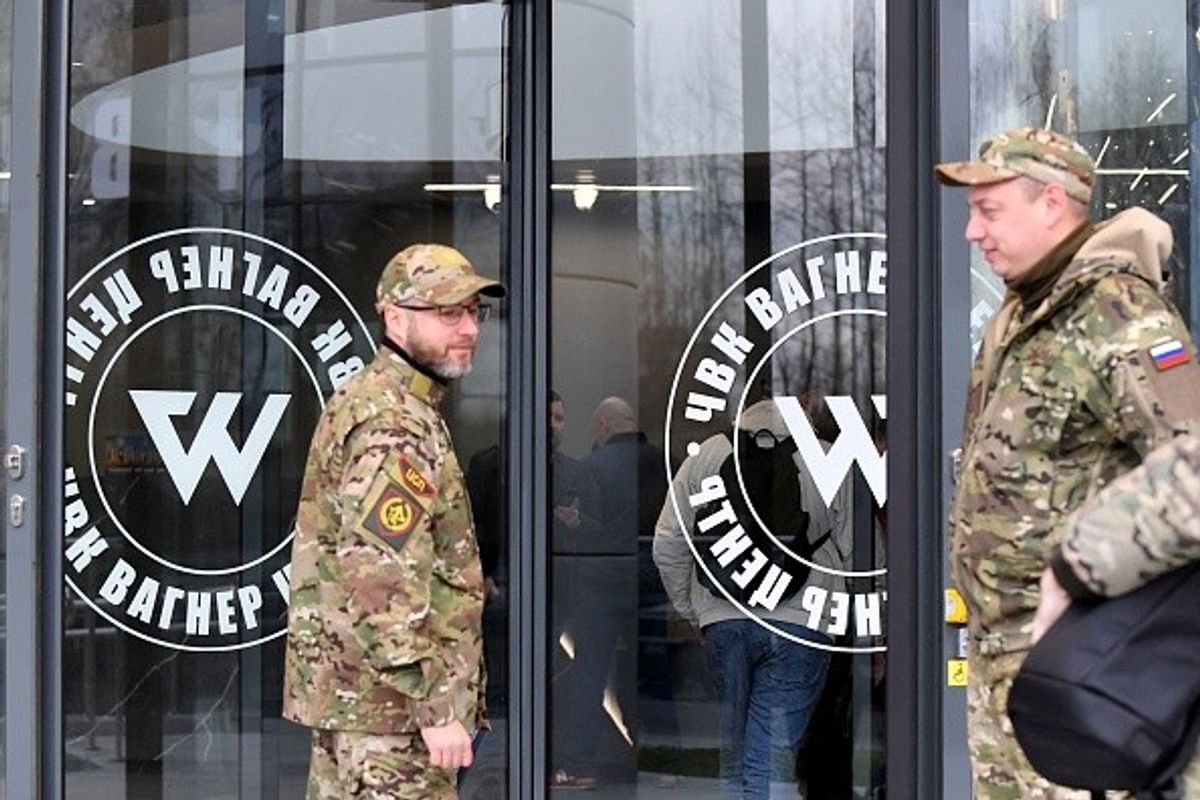EXPERT ANALYSIS — While the sinking of the Russian cruiser and Black Sea flagship Moskva is unquestionably the most eye-catching episode in the conflict at sea between Russia and Ukraine since the launch of the Russian invasion, the losses of other Russian naval vessels are also significant.
Most recently, two Russian Raptor patrol boats were reportedly hit by Ukrainian drones in the Black Sea. Although damage to the boats has not been confirmed, video evidence suggests it is substantial. Early in the conflict, another Raptor boat was reportedly struck by a Ukrainian anti-tank missile.
And about a month after Russia began its invasion, it lost a landing ship in the port of Berdyansk when a Ukrainian attack, probably a missile, reportedly sank the ship at the pier. All these developments were eclipsed in spectacular fashion when the Moskva sank on April 14.
Assuming Moskva was hit by Neptune missiles, the readiness and capabilities of its armaments and crew become key areas of inquiry. The Economist notes Moskva was protected by three air defense systems — S-300F and OSA-MA missiles to shoot down threats at long and short range, and automated AK-630 Gatling guns for close-in defense.
Moskva’s sensor and EW capabilities also have been brought into question, drawing attention to an area of increasing concern for naval leaders. Regarding shipboard technology, Adm. Michael Gilday, Chief of Naval Operations, recently underscored the importance of “counter-C5ISR&T” — command, control, computers, communications, cyber-defense (C5), intelligence, surveillance, and reconnaissance (ISR). “This is our effort,” Gilday explained, “to blind the opposition so that we can maneuver effectively and maneuver inside the enemy’s weapons engagement zone for a certain amount of time.”
The broader and longer-term implications of a naval loss of this kind have been addressed by Cipher Brief Expert and retired Adm. James Stavridis (Ret.), former NATO supreme allied commander.
In a separate assessment, a particular area of inquiry has to do with the ocean-going rivalry of the U.S. and China, with issues for the navies of both nations to consider with the Moskva firmly in mind.
Against this backdrop, The Cipher Brief turned to several naval experts for insights into the sinking of the Black Sea flagship, and its aftermath. These interviews have been edited for length and clarity.
The Experts
Bradley Martin, director of the RAND National Security Supply Chain Institute
Bradley Martin is the director of the RAND National Security Supply Chain Institute, and a senior policy researcher at the RAND Corporation. Martin retired from the Navy as a surface warfare Captain after 30 years service, including four command tours. He holds a Ph.D. in political science from the University of Michigan, and a B.A. in political science from the University of New Mexico.
Michael B. Petersen, director of the Russia Maritime Studies Institute and an associate professor at the U.S. Naval War College
Michael B. Petersen is the director of the Russia Maritime Studies Institute and an associate professor at the U.S. Naval War College. Prior to his appointment, he served at the Defense Intelligence Agency and the National Security Council. He is also the author of "Missiles for the Fatherland” as well as articles, essays and book chapters on military intelligence and strategic weapons history. He holds a Ph.D. in history from the University of Maryland, College Park.
Dmitry Gorenburg, senior research scientist, Center for Naval Analyses
Dmitry Gorenburg is an expert on security issues in the former Soviet Union, Russian military reform, Russian foreign policy, and ethnic politics and identity. His recent research topics include Russian naval strategy in the Pacific and the Black Sea, and Russian maritime defense doctrine. He received a B.A. in international relations from Princeton University and a Ph.D. in political science from Harvard University.
Steven Wills, navalist for the Center for Maritime Strategy at the Navy League
Steven Wills currently serves as a navalist for the Center for Maritime Strategy at the Navy League of the United States. He is an expert in U.S. Navy strategy and policy and U.S. Navy surface warfare programs and platforms. Wills had a 20-year career as an active-duty U.S. Navy officer and served on a variety of small and medium surface combatants. Wills holds a Ph.D. in history from Ohio University.
The Cipher Brief: In the continuing conflict in Ukraine, what repercussions does the loss of the Moskva have on Russia’s battle plans, especially in connection with possible Black Sea amphibious landings?
Bradley Martin: The loss of Moskva demonstrates that Ukraine possesses the means to target and sink surface ships. In and of itself, the loss of the Slava wouldn't be that big a deal; it's not as if the one ship was having all that effect on the way the campaign was going. What it does do is it shows Russia is very vulnerable in the Black Sea and that it can't count on being able to do whatever it would like to do. So, if it were planning on mounting an amphibious assault on ports in the Black Sea, it has to be thinking twice now because the Ukrainians showed an ability to track, to target, and to deliver lethal munitions. So, I think that it doesn't completely eliminate Russia's ability to operate in the Black Sea, but it shows them that they are vulnerable if they try to do it.
Michael Petersen: The Moskva's sinking is unlikely to have a significant effect on ground operations, especially now that combat has shifted east. However, it removes a critical afloat air defense capability from the Black Sea fleet. We may be seeing the results of that now. Ukraine's Bayraktar UCAVs are at less risk now than they were previously, and may have more success against Russian surface vessels. If the Russians are less able to provide SAM coverage at sea for everything afloat, they will need to provide combat air patrols or be confident that they can interrupt the C2 links between Ukrainian UCAVs and ground control stations. They have shown little ability to do the latter, and have done very little of the former. The northwest Black Sea is now more contested than it was a few weeks ago.
Amphibious assault operations along Ukraine's coast are probably a dead letter at this point. Amphibious vessels may, however, be used for resupply, in captured ports, though we have seen that these operations aren't without risk.
Dmitriy Gorenburg: In terms of positioning forces, the Russians now have to be much more careful to move their ships farther from shore because of the threat posed by these missiles. What they were doing prior is they were still bringing ships closer for harassment…maybe pin down some forces on the Ukrainian side to try to protect the coast. Now they have to either keep the ships well away from the coast or run the risk of having them attacked by Neptunes as well.
I think amphibious landings were already largely off the table because of the bigger failure of Russian military operations in the south. Those only made sense in conjunction with a continuing ground offensive — if they take Mykolaiv and can then head for Odessa with ground forces, then an amphibious landing reinforces that, pins down Ukrainian troops. If you're the Russian Army and you get stuck between Kherson and Mykolaiv, then an amphibious landing near Odesa doesn't make sense anymore.
Steven Wills: Moskva was the Black Sea Fleet’s one ship with an area air defense capability, meaning she could in theory protect more than just herself from air and missile attack. Moskva’s two sister ships with the same air and missile defense capabilities are in the Mediterranean Sea and could face Montreux Convention restrictions in getting into the Black Sea as Russia is classified as a belligerent in its current war with Ukraine. The lack of a dedicated air defense ship for the Black Sea fleet means that any amphibious operations Russia might conduct would need another source of air and especially missile defense. While the Russians can provide aircraft, they lack sea-based missile defense ships to cover amphibious operations against Ukraine.
The Cipher Brief: A host of contributing factors has been posited for the Moskva’s sinking. What factor, or combination of factors, do you think led to the shocking loss of the Russian flagship?
Martin: At the open source level, we don’t know all the things that might have caused the sinking, but here are some notable potential factors. First, the ship did not seem to be doing much to vary or conceal its movements, thus greatly simplifying targeting. Second, the air search radar appears to have been stowed and there is no indication that it fired its surface-air missiles, which indicates that its combat systems were not in a ready condition and that it was effectively unalerted. That’s not really a matter of sophistication but of readiness. Third, older Russian ships were not really designed with damage control in mind. The Cold War at-sea expectation was that a ship like Slava/Moskva would expend its missiles and sink adversaries, not take hits and survive them.
Petersen: The difficulty of air defense at sea is extraordinarily underrated. Scores of things have to go right for a ship to survive being engaged by cruise missiles. Early warning radars need to be functioning correctly to give the ship enough time to react; computer processing needs to be able to pick out radar returns from enormous amount of ocean "clutter," operators need to be extremely well-trained and well-led to be able to react quickly to that data passed to them; target acquisition and engagement radars need to gain track on the incoming weapons, etc.
My suspicion is that it was not any one factor, but rather a combination of failures that led to Moskva's sinking. It was either extremely poor risk analysis or hubris that led Moskva to operate where she was. Further, photographs of the ship seem to indicate that Moskva's radars were slewed to the stored position and not active. I'm not aware of any evidence that Moskva fired any weapons in self-defense. Russian sailors, while all professional sailors and not conscripts, were probably poorly trained on damage control and given equipment that may not have worked properly. Moskva was also one of the oldest ships in Russia's fleet and was even considered for decommissioning before being pressed back into service a few years ago. It is unlikely that she was fully ship-shape and ready for high-end combat operations.
Gorenburg: There are a couple things to consider here. The S-300, which is the main air defense system they have, one of its known limitations is that it's very good at detecting and countering attacks from above, but the closer the missiles get to surface-skimming lines of attack, the more difficult it becomes for the S-300 to detect. One of the main areas of improvement in anti-ship missile technology in the last decades has been the ability to get missiles closer and closer to the water surface as they come in.
There is a larger question of whether we're entering a time when anti-ship cruise missiles make life very difficult for large surface combatants. It's mostly about the relative cost of a missile versus how much it costs to develop a large ship. Because if you launch a hundred missiles and one gets through — even if it doesn't sink a large ship – it creates this disproportionate cost-benefit kind of situation.
Wills: If the Russian Navy has poor intelligence regarding the cruise missile threat from Ukraine, they might have allowed their ships to become complacent and not be a full readiness to respond to such an attack. The U.S. Navy frigate USS Stark was hit by Iraqi cruise missiles in 1987 because she was not at the appropriate readiness condition to use her own self-defense weapons. Moskva too might have been unprepared to respond to cruise missile attack. Electronic interference might have limited Moskva’s ability to respond to the attack. I do not know Moskva’s internal structure or watertight compartment arrangement, but when some of my NATO colleagues toured the ship in 2007 they reported that there was much wood paneling in the officers' quarters area of the ship (very flammable,) and that much of the damage control equipment was painted over with many coast of paint and as a result probably not operational. The Moskva was likely to be lost as soon as the Russians reported that the crew had abandoned ship. Effective damage control is not possible absent the crew from the ship.
The Cipher Brief: A disaster of this scale inevitably leads to questions about the vulnerabilities of surface warships to increasingly sophisticated anti-ship weaponry. What lessons for both ship defensive systems, and naval tactics, does the Moskva episode offer?
Martin: All surface ships are subject to anti-ship cruise missile attack if located. Advanced U.S. Navy combatants can deal with a large and sophisticated attack, but ultimately, survival depends on dispersion, concealment/effective emissions control, and finding ways to complicate enemy targeting. By dispersion I mean what a naval force is able to do to exploit the distances that the ocean offers. A naval force is able to move and also is able to shut off emitters and do things that makes it hard to track. This can be done over a wide area and that's how ships survive. Once they're located, if an adversary wants to target and attack them, it becomes very difficult for them to do very much about it. So, in someplace like the Black Sea, where there's just not that much space to maneuver, it's particularly critical that it should not be very predictable. The U.S. Navy also has a higher standard of damage control than the Russian Navy, and most of its ships would likely survive a two-salvo hit. But no Navy should rely on active defense and damage control for surface ship defense. Once targeted, any surface ship is vulnerable.
Petersen: It's very difficult to know exactly what the proper lessons are from this attack, especially because we still have relatively little detail on it. One lesson, noted above, is that naval air defense is extremely difficult and should not be taken for granted. The Moskva attack does give me pause, especially because the two Neptune missiles that struck her were not particularly sophisticated weapons. By comparison, modern Chinese and Russian anti-ship cruise missiles (ASCMs) are far more of a challenge, even to U.S. and allied navies. Modern Chinese and Russian cruise missiles are supersonic and highly maneuverable. Large salvo tactics will also place enormous stress on the ability of air defense systems such as Aegis to respond. Finally, tactical hypersonic ASCMs such as Russia's Tsirkon, which reportedly flies at Mach 8, are just around the corner.
One lesson that I draw is that avoiding detection (counter-ISR) is much more likely to increase survivability than any measure designed to shoot down missiles. Adversaries cannot shoot what they can't see, so avoiding detection in the first place is critical. Relatedly, kinetic defense, that is, using missiles or guns to shoot down missiles, will continue to increase in difficulty. Instead, "soft kill" technology such as jamming and obscurants are likely to be as much if not more valuable to a ship's survival.
Gorenburg: This is something that the Russians have actually maybe figured out earlier than others in that they have been putting a lot of emphasis on very small ships that can launch land attack cruise missiles. That gives you a lot of the same benefits of having that standoff strike capability at a much lower per unit cost. If you build 10 small ships, a 1000 ton or something like that, that maybe have eight launch tubes or something, you might be better off than building one large ship with 64 launch tubes, because if you damage that one large ship, the whole capability is gone. Whereas with smaller ships, you have that many more and you can lose one, but you can still have 70-80 percent of the capability, unless you get them all.
There are other considerations if you’re a country with broad ocean responsibilities where you need larger ships. Whereas Russia, which was always mostly focused on nearby areas, doesn't care that much if a ship can't sail off to Latin America or some other distant area. For the U.S., you're going continue to need larger ships just because of the global mission set. But for most navies that are much more locally oriented, the small ship becomes more attractive in that environment.
Wills: None of what happened to Moskva is a “new” issue in naval warfare other than perhaps — if correctly reported — that the Moskva was distracted by aviation drone operations. Even then, such drones would not carry jammers large enough to prevent Moskva from seeing and engaging cruise missiles. Those weapons sank two British warships in the Falklands war, heavily damaged the USS Stark in 1987, and damaged the Israeli corvette Hanit in 2006. U.S. warships like the Arleigh Burke class destroyer are optimized for air and missile defense and are much more capable than was Moskva in that role. The missiles that hit Moskva were also subsonic weapons. Countering supersonic and the new hypersonic weapons will be even more challenging as there will be much less time to react. The continuing lesson from Moskva is that surface ships must be prepared to counter cruise missile attacks, especially in littoral regions where there are more potential threats.
The Cipher Brief: Do you think the Moskva could have an appreciable effect on Chinese thoughts and preparations for a potential maritime assault on Taiwan?
Martin: I don’t claim special insight into the PRC/PLA’s thinking on an amphibious assault, but this case should alert everyone to the risks of such an assault. The Taiwan Strait is a confined water space. China would have to move large amounts of shipping across the space in order to invade Taiwan, and Taiwan is not defenseless. So China would have to be aware that there would be significant challenges associated with trying to carry out a large-scale amphibious operation to take Taiwan. China almost certainly sees a couple of things – they would see a really complicated operation involving large amounts of logistic support and considerable coordination. They would also see that surface ships are very vulnerable and that the use of surface ships to carry out an operation is going to expose them to potential targeting and destruction. I think they could conclude that if we're going to do this, we need to make sure it's over quickly. They could conclude that, but they might equally conclude that this is a really dangerous thing to do, and it would be very difficult to carry out and we would lose tons of shipping and thousands of people trying to do this, so maybe this wouldn't be a good idea.
Petersen: I'm not a China expert and can't comment on this with any authority. However, I do think that it is human nature to think, "this couldn't possibly happen to me." This is true for both Chinese and American officers. Further, the U.S. has approved delivery of Harpoon coastal defense cruise missiles to Taiwan. These missiles aren't all that dissimilar to the Neptunes that struck Moskva. Taiwan also produces an indigenous system. The more Taiwan adds mobile coastal defense cruise missile systems to its capabilities, the challenging the problem of amphibious invasion becomes.
Wills: China has not been in active combat with a peer nation’s military forces since 1969 when it engaged in a border war with the Soviet Union and in 1979 when it invaded and briefly occupied parts of Vietnam in a brief punitive expedition. The Chinese are avid consumers of military lessons learned and the loss of Moskva may have an impact on their planning for war at sea. It could cause them to seek improved readiness of their ships to respond to air and missile attack and/or improve their ability to conduct damage control efforts.
The piece includes research, analysis and reporting by Cipher Brief Analyst Ken Hughes
Today’s constant barrage of information makes it easy for countries to wage disinformation campaigns and your emotions are the weapon of choice. Learn how disinformation works and how we can fight it in this short video. This is one link you can feel good about sharing.
Read more expert-driven national security insights, perspective and analysis in The Cipher Brief because National Security is Everyone’s Business.


















